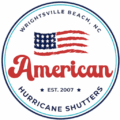Matthew Burns
President
Matthew Burns is a storm protection expert and the President of American Hurricane Shutters. Continuing his family's legacy, he combines 6+ years of hands-on experience with an analytical background from Duke University (B.S., Economics). He specializes in breaking down complex building codes and the long-term financial benefits of hurricane protection, helping Carolina homeowners make safe, informed, and cost-effective decisions.
